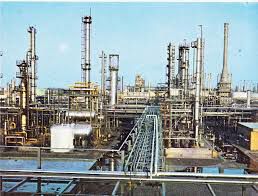THE COMING OF THE BRITISH CONSERVATIVE PARTY TO OFFICE IN 1951 AND THE NATIONALISATION OF THE ANGLO-IRANIAN OIL COMPANY’S CRISIS.
The Iranian Prime Minister, this time, was determined to be firm and not to give Britain and America any further consideration. Musaddiq wrote to the Americans blaming the British Government for the nineteen month’s delay for a settlement, following the nationalisation of the Anglo-Iranian Oil Company. The British were emphatic on compensation for losses, resulting from the unilateral ending of the 1933 Agreement, and viewed Musaddiq’s points as unreasonable. Dr. Musaddiq, on 16th October, announced over the radio his intention of breaking off diplomatic relations with the United Kingdom. On 22nd October, diplomatic relations between Iran and Britain were broken off, soon after the last member of the British Embassy left Iran. ‘Iran should be left to “stew” for a bit’,56 said a British Foreign Office Official.
In spite of the fact that there were no diplomatic relations between Britain and Iran, the United States Government did not give up hope of a settlement. The United States officials did not believe that the victory of Eisenhower in the presidential election of November 1952 would lead to any change of policy.
The American Ambassador to Teheran, Loy Henderson, had an interview on 10th November with the Iranian Prime Minister, Dr. Musaddiq. The Iranian Prime Minister suggested to the United States Ambassador that US companies should start purchasing Iranian oil, and the US Government should provide a loan of $100,000,000. In a statement the State Department, on 7th December 1952, expressed the US Government’s reluctance in interfering with any American oil company which wanted to buy oil from Iran. Anthony Eden, the British Foreign Secretary in a statement in the House of Commons, on 8th December, announced that ‘Her Majesty’s Government continue to regard the products of the oil industry in South Persia as the property of the Anglo-Iranian Oil Company.’57 There was a high degree of pressure by independent American oil companies on the American Government, concerning the issue of buying oil from Iran. The American position was becoming increasingly weak. To prevent any additional pressure on the United States’ stand from the oil companies until the taking over of the Eisenhower’s Republican administration in January 1953, a new set of proposals was drafted by Dean Acheson. The proposals put forward by Acheson were that the International Bank, together with a group of major American companies, would pay a sum to the Anglo-Iranian Oil Company, in order to settle all of its claims. Then the American oil companies, in conjunction with the National Iranian Oil Company, would form a Perso-American Company in order to get the oil refinery in Abadan working again and resume oil production. The United States companies would take up the oil, and the Anglo-Iranian Oil Company would be allowed to buy oil on a long-term basis. The loan from the International Bank and the oil cartel would be repaid in ten annual instalments.58
The American proposal was subsequently discussed between Dean Acheson and Anthony Eden in Paris. The British Government was insistent that the issue of compensation should be submitted to international arbitration.59
- M. A. HEISS, The united States, Great Britain, and Iranian Oil, 1950-1954, Ph.D. Thesis, The Ohio State University, 1991, p. 246.
- Ibid, p. 287.
- J. A. BILL and W. R. LOUIS, op. cit., Chapters 6, 7, 10.
- Ibid.



